|
|
|
Sort Order |
|
|
|
Items / Page
|
|
|
|
|
|
|
| Srl | Item |
| 1 |
ID:
185107
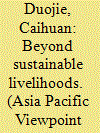

|
|
|
|
|
| Summary/Abstract |
This paper delves into rural peasants' livelihood-related agrarian changes revolving around their three major livelihood strategies in Qinghai. These strategies include peasant agriculture, seasonal migrant labour and caterpillar fungus harvesting, the latter two of which have been adopted since the mid-1990s. The research particularly focuses on rural Tibetan peasants' lived experiences in their efforts to achieve sustainable livelihoods through these three strategies in a specific village context. In doing so, the paper highlights resources, qualifications, opportunities, changes and challenges in rural peasants' livelihood realities. The empirical evidence from this paper suggests that rural Tibetan peasants' diverse ways of making livelihoods have a greater potential to imagine and build sustainable and equitable livelihoods. I argue that sustainable livelihoods approaches must be pursued in tandem with a diverse economies framework for analysing rural peasants' present way of making livelihoods. This new and critical way of studying rural peasant livelihoods can particularly highlight non-capitalist economic relations and practices that are the major contributors to sustainable and equitable livelihoods for Tibetan peasants.
|
|
|
|
|
|
|
|
|
|
|
|
|
|
|
|
| 2 |
ID:
193191
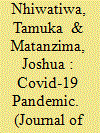

|
|
|
|
|
| Summary/Abstract |
Man-made reservoirs are constructed to meet certain purposes and Lake Kariba, Zimbabwe, was designed for hydroelectric power generation. However, it has developed other multiple uses, and the growth of fisheries on the lake has had a significant impact on the livelihoods of local communities. The declaration of Covid-19 as a pandemic in Zimbabwe in March 2020 was quickly followed by the imposition of national lockdowns with varying levels of severity up to the present day. This was done to curtail the spread of the disease, meanwhile enhancing the nation’s capacity in terms of acquiring testing kits, constructing more admission and quarantine centres as well as educating the people about ways to keep safe. In response to the calls by the government to monitor the movement of people and compliance of the lockdown rules, the Zimbabwe National Parks and Wildlife Management Authority (ZNPWMA), the governing body of the Lake Kariba fisheries, imposed rules that have significantly impacted the fishing communities at Lake Kariba. Both gillnet fishers and rod and line fishers have been impacted, but our focus here is on women rod and line fishers. Using the precarious livelihoods conceptual frameworks, we show how the changes in water management during the Covid-19 pandemic lockdowns has generated high levels of precariousness on the livelihoods of women at Kariba. We define precariousness as the condition of uncertainties brought to the women fishers by changes in water restrictions. The precarity of women was induced by several factors. For instance, the women fishers reported that restrictions to accessing fish in areas with high catches impacted them. They are also now obliged to pay exorbitant fishing fees in a way to discourage them to fish; they were frequently chased away from the Lake by ZNPWMA officers; they had limited amount of time to fish due to curfews; and failure to comply results in heavy fines imposed on them among other challenges. We show how these challenges interact with the current Zimbabwe socio-economic crisis to worsen the precariousness and vulnerability of women fishers at Lake Kariba. Data presented in this manuscript are based on participant observation and interviews with women fishers at Lake Kariba.
|
|
|
|
|
|
|
|
|
|
|
|
|
|
|
|
| 3 |
ID:
083844
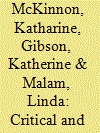

|
|
|
| 4 |
ID:
105061
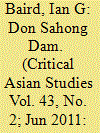

|
|
|
|
|
| Publication |
2011.
|
| Summary/Abstract |
Plans are underway to construct twelve large hydropower projects on the un-dammed lower and middle mainstream Mekong River in Laos, Thailand, and Cambodia. One of the planned projects is a 30-32 meter-high hydroelectric dam with an expected 240 MW installed generating capacity to be built on the Hou Sahong Channel, less than one kilometer north of the Laos-Cambodia border, in the Khone Falls area of Khong District, Champasak Province, southern Laos. The project's objective is to generate revenue by exporting electricity to Thailand or Cambodia. Concerns have been raised about the Don SahongDam(DSD), however. The main ones relate to potential repercussions on aquatic resources, and especially wild-capture fisheries dependent on migratory fish. This article examines the regional implications of the DSD, including possible impacts on food security, nutrition, and poverty alleviation. Fisheries losses in the Mekong Region from the DSD would negatively affect the nutrition of hundreds of thousands or even millions of people, especially in parts of Laos, Cambodia, and Thailand where nutritional standards are already low. Mekong fisheries are integral to food security in the region, and the DSD would make it difficult for governments, especially in Laos and Cambodia, to reach their health-related United Nations Millennium Development Goals and their objectives for reducing poverty.
|
|
|
|
|
|
|
|
|
|
|
|
|
|
|
|
| 5 |
ID:
178384
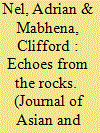

|
|
|
|
|
| Summary/Abstract |
This article seeks to characterise and contextualise land reform, and the experiences of resettled farmers, in the under-researched Matabeleland South. It does so through a historicised, landscape approach to changes in the post-Fast Track Land Reform Programme agrarian structure in two wards in Matobo District. While new land dispensation is still consolidating, outcomes are varied, and while beneficiaries are vulnerable to drought in mixed farming there is also notable resilience. Importantly, we argue that changes in the landscape ‘echo’ the past, where material and discursive changes play out at the same time as agrarian livelihoods evolve.
|
|
|
|
|
|
|
|
|
|
|
|
|
|
|
|
| 6 |
ID:
187017


|
|
|
|
|
| Summary/Abstract |
Coal-fired thermal power has recently become one of the most pressing issues in Vietnam's development agenda. The country's economic development, industrialization and modernization, and population increases have put increasing pressure on energy demands. The Vietnamese government sees coal-fired power as a way forward in ensuring energy security, which had led to the planning and construction of plants nationwide, particularly from 2016. Simultaneously, a growing anti-coal power development movement argues that coal-fired power adversely transforms local people's lives and livelihoods, and negatively impacts the ecological balance in plant locations. Through the lens of environmental justice, this paper examines the development of Vietnam's power sector with a focus on coal-fired thermal power and its impacts on local livelihoods, food production and water resources. The paper argues that Vietnam's development of coal-fired power is about much more than energy. It speaks to the state's rule over resources, and how this very process of power generation disproportionately affects local communities in the Mekong Delta.
|
|
|
|
|
|
|
|
|
|
|
|
|
|
|
|
| 7 |
ID:
163242
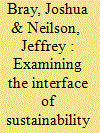

|
|
|
|
|
| Summary/Abstract |
Voluntary sustainability standards are used as both a means of securing coffee supply by large coffee firms and a development intervention to address rural poverty and environmental management in the Global South. Using a case‐study approach, we have examined the interface between a value‐chain sustainability programme and the livelihood trajectories of smallholder producers in upland Sumatra. Our research found the programme has had minimal impacts for coffee producers to date. The level of commitment required of producers appears incompatible with the particular way that coffee is currently embedded within local landscapes, livelihoods and poverty alleviation pathways. Various sustainability standards articulate a narrative of rural development underpinned by an assumption that agricultural modernisation is the preferred pathway out of poverty for rural households. As a result, there is some risk that sustainability programmes may be inadvertently attempting to encourage household investment in a particular kind of agriculture, which is intended to assist sustainability of supply, but is poorly aligned with prevailing processes of poverty alleviation. These observations are based on a detailed study of agrarian change among the Semendo people of South Sumatra province, where processes of rural development are far more complex than assumptions presented by mainstream sustainability standards.
|
|
|
|
|
|
|
|
|
|
|
|
|
|
|
|
| 8 |
ID:
187019


|
|
|
|
|
| Summary/Abstract |
This study explores the impact of Technical and Vocational Education and Training (TVET) on households in Samoa, particularly those households that invested in the TVET qualification and certification of at least one member of their household. Significant benefits accrue to households through productive employment of the TVET-certified household member, and this study is one of a kind designed to gather some base line socio-economic data from 15 case study households to validate these claims. The study is framed within the sustainable livelihoods approach and capabilities approach. Improved skills of TVET persons provide a sustainable livelihood for their households and enabled strengthening of people's capabilities to make significant contributions to their families, community and national development agenda. Questionnaires and focus group discussions were methods engaged to answer the study question on the socio-economic impacts of TVET-certified members on their households. The results substantiated what we have always observed and believed, that the households with at least one TVET-certified member is able to make positive physical and social contributions towards improving the livelihood of the entire household.
|
|
|
|
|
|
|
|
|
|
|
|
|
|
|
|
| 9 |
ID:
080309
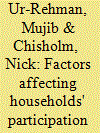

|
|
|
|
|
| Publication |
2007.
|
| Summary/Abstract |
In this article the factors affecting the attitudes and preferences of households regarding natural resource management in the Abbottabad district of Pakistan are analysed. The findings suggest that non-government organizations were doing better than government agencies in motivating the user groups towards sustainable use and management of natural resources through local organizations. However, it depends on the households' socio-economic status and its linkage with their livelihoods to participate in natural resource management activities. The study can assist policymakers by identifying the key areas for the implementation of their programmes related with natural resource management activities through community participation
|
|
|
|
|
|
|
|
|
|
|
|
|
|
|
|
| 10 |
ID:
168234


|
|
|
|
|
| Summary/Abstract |
Local religions, Islam and Christianity influence and shape West African livelihoods where for many spirituality is an integral part of work, time and making a living. For farmers the spiritual imbues their understanding of the natural world, as well as affecting the control and allocation of resources and their timely use. For the Sufist Mouride brotherhood of Senegal their work ethic nurtures agriculture and supports a diaspora of petty traders and businesses. Meanwhile, the Christian Pentecostal Church encourages myriad small businesses, and its promotion of a work ethic that has occasioned the contention of a Weberian-style transformation. The creation of sustainable networks of socio-economic change through religious adherence is not in doubt, but whether this will promote a general developmental shift is more contentious. Pentecostals emphasize education and literacy, a priority for most governments, but without job opportunities there is widespread discontent among the young, even the educated. Furthermore, the young are disenchanted by patrimonial-clientelist societies, and it is through religion that violent dissent is articulated. Assertions that religion per se is inimical to social and economic change in West Africa are difficult to substantiate. What is a problem for farmers and small businesses is the uncertainty not just of their immediate environments, but of the volatility and dysfunctional nature of the state, and a lack of enabling conditions. Thus, religion and spirituality provide help in difficult times for people, but also opportunities for improvement in their livelihoods and lifestyles.
|
|
|
|
|
|
|
|
|
|
|
|
|
|
|
|
| 11 |
ID:
187018
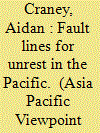

|
|
|
|
|
| Summary/Abstract |
Instances of civil unrest and disorder have pockmarked the mainly peaceful functioning of multiple Pacific states in recent decades. This paper examines factors which can be seen as fault lines for predicting and mitigating such unrest, with a particular focus on Fiji and Solomon Islands. Drawing on data collected through interviews with youth advocates and activists, it becomes clear that the common justification of ‘ethnic tensions’ for past unrest and fears of future unrest being necessitated by a ‘youth bulge’ oversimplifies the complexity of factors that lead to disorder. Issues of land rights, uncertain livelihood futures and public perceptions of inequality provide more salient framings for understanding why citizens engage in unrest. Indeed, it is perceptions of injustice and inequality which may well prove to be the greater indicator of the likelihood of any future destabilisation.
|
|
|
|
|
|
|
|
|
|
|
|
|
|
|
|
| 12 |
ID:
179113
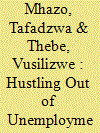

|
|
|
|
|
| Summary/Abstract |
Youth unemployment has emerged as a major policy issue in the recent past. Within policy circles two solutions have been proposed: first, investing in youth education, and second, incorporating youth into agriculture. Our thesis, backed by a long history of proletarianisation, is that perceptions of work and agriculture, which have become deeply entrenched in society, tend to undermine any prospects of educated youth engaging in agriculture-based livelihoods. We develop our argument by focusing on the experiences, responses and livelihood pathways of young university graduates in the city of Bulawayo. We show that young graduate youth prefer livelihood activities which maintain their status as educated citizens, and that agriculture does not confer such status. We argue that young graduates’ aspirations and livelihood pathways are often dictated by societal attitudes and views of what is an acceptable occupation. In this regard, our thesis contradicts the widespread faith in agriculture placed by policymakers in Africa.
|
|
|
|
|
|
|
|
|
|
|
|
|
|
|
|
| 13 |
ID:
173986
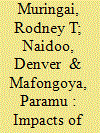

|
|
|
|
|
| Summary/Abstract |
Small-scale fisheries play a significant role as a source of employment, livelihood strategy and contributor to food security. However, changes in climatic variables alter the productivity and distribution of marine and freshwater fish species, negatively affecting the livelihoods of fishery-dependent communities. This study seeks to identify small-scale fishers’ livelihoods and examine the impacts of climate change on livelihoods and food security of small-scale fishing households. The study was conducted in Sanyathi fishing basin in Lake Kariba, Zimbabwe. The Sustainable Livelihood Approach framework of the Department for International Development was used to define the small-scale fishers’ livelihood assets and activities. The study employed a mixed-method approach for data collection. A pretested, semi-structured questionnaire, focus group discussions and observations were used to collect data from the small-scale fishers. The data collected were subjected to descriptive and bivariate analysis. The present results indicate that fishing is the community’s primary livelihood activity. More than 62% of fishermen stated that fishing revenue is declining, owing to declining fish catches. Of participants, 98% recognised food purchases as the primary source of food. Therefore, 78% of the small-scale fishers perceive their households to be food insecure due to declining incomes from fisheries. These findings show the need for policymakers and development agencies to formulate strategies that specifically target fishing communities whose livelihoods rely on natural ecosystems.
|
|
|
|
|
|
|
|
|
|
|
|
|
|
|
|
| 14 |
ID:
151519


|
|
|
|
|
| Summary/Abstract |
The convergence of diverse global factors – food price volatility, the increased demand for biofuels and feeds, climate change and the financialisation of commodity markets – has resulted in renewed interest in land resources, leading to a rapid expansion in the scope and scale of (trans)national acquisition of arable land across many developing countries. Much of this land is on peripheral indigenous peoples’ territories and considered a common property resource. Those most threatened are poor rural people with customary tenure systems – including indigenous ethnic minority groups, pastoralists and peasants – who need land most. In Ethiopia large areas have been leased to foreign and domestic capital for large-scale production of food and agrofuels, mainly in lowland regions where the state has historically had limited control. Much of the land offered is classified by the state and other elites as ‘unused’ or ‘underutilised’, overlooking the spatially extensive use of land in shifting cultivation and pastoralism. This threatens the land rights and livelihoods of ethnic minority indigenous communities in these lowlands. This article argues that recent large-scale land acquisitions are part of state strategy for enforcing political authority over territory and people. It examines the implications of such strategy for indigenous ethnic minority groups, focusing particularly on the Benishangul-Gumuz region.
|
|
|
|
|
|
|
|
|
|
|
|
|
|
|
|
| 15 |
ID:
144841


|
|
|
|
|
| Summary/Abstract |
It is widely assumed that the impacts of climate change on atolls will render them uninhabitable. The Carteret Islands, an iconic Pacific atoll, is experiencing physical changes, documented in the media, the outcome of multiple factors, alongside critical economic livelihood problems. Its population has sought to resettle on nearby Bougainville Island, but land has not become available. The search for migration opportunities parallels trends on coral atolls elsewhere where survival strategies have involved regional and international ties, with cultures of migration, focused on more distant international destinations. Carteret Islanders have not been able to mobilise similar relationships. For many atolls and atoll states, migration has increasingly become a livelihood strategy, irrespective of climate change. That is likely to become even more true in the future, but the outcome will be dependent on policies and practices in metropolitan destination states.
|
|
|
|
|
|
|
|
|
|
|
|
|
|
|
|
| 16 |
ID:
085526


|
|
|
|
|
| Publication |
2008.
|
| Summary/Abstract |
This article explores the livelihood pathways of serving Ugandan Army soldiers and traces their methods and motivations for enlistment. All were from areas of northern Uganda affected by nearly two decades of violent instability. With the Uganda People's Defence Forces (UPDF) increasing recruitment eligibility requirements and taking other measures to improve professionalism, some soldiers enlisted using false credentials and names, travelled to skirt unofficial ethnic quotas, and joined against their family's wishes. The Army's defence reform process was intended to preclude such problems. The article concludes with reflections on what strategic deception (by both recruits and the Army) may imply for warriors' honour.
|
|
|
|
|
|
|
|
|
|
|
|
|
|
|
|
| 17 |
ID:
116898


|
|
|
|
|
| Publication |
2013.
|
| Summary/Abstract |
Livelihoods approaches emerged from a broad range of efforts to understand how people live in particular places. They have since cohered into often instrumentally applied frameworks that rest on the broadly held assumption that livelihoods are principally about the management of one's material circumstances. This assumption limits the explanatory power of livelihoods approaches by shifting a range of motivations for livelihoods decisions outside the analytic frame. This article extends efforts to recover a broader lens on livelihoods decisions and outcomes by conceptualising livelihoods as forms of intimate government, local efforts to shape conduct to definite, shifting, and sometimes contradictory material and social ends. By employing a Foucault-inspired analytics of government to the study of livelihoods in Ghana's Central Region, the paper presents a systematic, implementable approach to the examination of livelihoods and their outcomes in light of this reframing, one where material outcomes are one of many possible ends of intimate government, instead of the end. By opening the analytic lens in this manner, we can explain a much wider set of livelihoods outcomes and decisions than possible under contemporary approaches.
|
|
|
|
|
|
|
|
|
|
|
|
|
|
|
|
| 18 |
ID:
178459
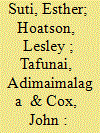

|
|
|
|
|
| Summary/Abstract |
This paper analyses the ‘Simbo for Change’ project in the Western Province of Solomon Islands, a collaboration between Simbo leaders and a Samoan non-governmental organisation (NGO), with funding provided by the Australian aid programme. We explore the role of local leadership in catalysing an island-wide community development project that has generated new livelihoods opportunities and led to greater community cohesion and more proactive governance. By mobilising around a ‘collective subject’ (Simbo as an island community), the project allowed existing skills and practices to be revalued and extended, particularly in relation to chiefly governance and the standing of women in the community. While mobilising the island scale was important in building social cohesion and support for livelihoods activities, this was not a parochial identity but was redefined by stronger connections to off-island markets, organic accreditation for Simbo, renewed interest from provincial and national government authorities and by the enduring trans-Pacific friendships established with the Samoan NGO and its trainers. The case study provides an example of the constructive potential of the island scale in Melanesia, whereas other recent studies of similar scale-making processes have focused on violent conflict generated by industrial scale mining.
|
|
|
|
|
|
|
|
|
|
|
|
|
|
|
|
| 19 |
ID:
185111


|
|
|
|
|
| Summary/Abstract |
The rapid expansion of urban development in Asia over the last 50 years has seen a rise in demand for building materials. From large construction companies to squatter settlers seeking to improve their housing, concrete is the building material of choice. In the Philippines there is plentiful supply of the limestone and aggregate (sand and gravel) required for concrete production. Alongside the large quarries owned by major corporations are small, often illegal quarries, supplying aggregate to the construction industry. In these shadow places informal miners scratch out a precarious livelihood. They are members of a vast artisanal and small-scale mining (ASM) workforce that is global in extent. This paper situates informal aggregate mining in the diverse economy of concrete in the Philippines and within the context of global ASM studies. With a detailed study of one quarry on the edges of Metro Manila, it reveals how mining contributes to the survival portfolio of poor households. Without romanticising the lives of quarry labourers, we identify a range of negotiations by which informal miners create a community of commoners in a contested quarry site. This research provides insight into the capacities that informal miners could bring to designing more sustainable development pathways within and beyond the extractive industry.
|
|
|
|
|
|
|
|
|
|
|
|
|
|
|
|
| 20 |
ID:
076873
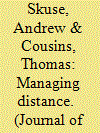

|
|
|
|
|
| Publication |
2007.
|
| Summary/Abstract |
This article examines rural telecommunications access and use among poor village households in the Eastern Cape, South Africa. Discussion is based upon a content analysis of 165 telephone calls, as well as a broader information and communication technology (ICT) ownership, access and use survey undertaken in 50 poor households within a number of rural villages in the Mount Frere district. These data are complimented and supported by qualitative data emerging from a longer-term UK Department for International Development-funded study of ICT use and social communication practices among the urban and rural poor in South Africa. The purpose of the article is to: (i) question existing notions of telecommunications access; (ii) assess the extent to which rural inequalities are exacerbated or ameliorated by telecommunications access; and (iii) examine the extent to which telecommunications are enlisted as a strategic tool by poor households for maintaining kin-based redistributive networks and enhancing livelihood sustainability.
|
|
|
|
|
|
|
|
|
|
|
|
|
|
|
|
|
|
|
|
|